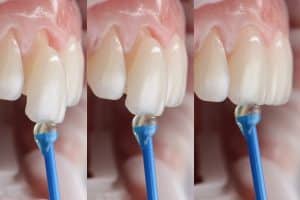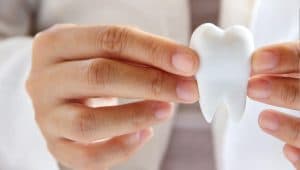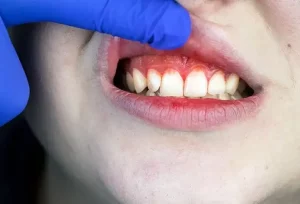Diabetes patients know that the condition can impair the eyes, nerves, kidneys, heart, and other vital organs. Did you realize that diabetes can also create oral problems? Diabetes and oral health are closely connected.
Diabetes increases the risk of gum disease, an inflammation of the gums and bones that keep the teeth in place. Periodontal disease can cause discomfort, foul breath, difficulty chewing, and tooth loss. For more information about diabetes and dental problems, continue reading.
Why are People with Diabetes More Likely to Develop Oral Health Problems?
Diabetes and dental health problems are frequently seen combined, and they have a lower resistance to infection, which can slow their recuperation time. If you have diabetes, you must pay extra attention to your oral health and dental care and maintain appropriate blood glucose levels. Visit your dentist every 6 to 12 months for advice on how to keep your teeth and gums healthy.
Diabetes is a frequent disease. Diabetes and oral health are equally important. Because the earliest signs and symptoms of diabetes can appear in the mouth, paying attention to your oral health and communicating with your doctor or dentist about any changes can provide an earlier diagnosis and treatment.
What Oral Health Problems are Associated with Diabetes?
We have already said diabetes, and oral health goes hand in hand. It does not matter if you have type 1 or 2 diabetes. Controlling your blood sugar levels is critical. The higher your blood sugar level, the greater your chance of specific health issues. Some health issues are listed below; let’s examine how diabetes affects dental treatment.
Tooth Decay (Cavities)
Tooth decay is the first problem you can see with diabetes and dental issues. Plaque builds on your teeth when carbohydrates and sugars in meals and beverages interact with these bacteria. Plaque acids assault the surfaces of your teeth (enamel and dentin). Cavities and gum disease can result from this. The higher your blood sugar level, the more sugars and starches are available — and the more acid is present to erode your teeth.
Early Stages of Gum Disease (Gingivitis)
Diabetes and oral health are crucial when it comes to gums. Diabetes impairs your capacity to combat microorganisms. If you don’t eliminate plaque with frequent brushing and flossing, it will solidify behind your gum line into tartar (dental calculus).
The longer plaque and tartar remain on your teeth, the more they irritate the gingiva, the area of your gums surrounding the base of your teeth. Your gums will get swollen and bleed readily over time, referred to as gingivitis. Taking care of your gums is fundamental for diabetes and dental health.
Advanced Gum Disease (Periodontitis)
Like the early stages of gum disease, advanced gum disease is also an issue for diabetes and oral health. If left untreated, gingivitis can advance to periodontitis, a more serious condition that affects the soft tissue and bone that support your teeth. Periodontitis eventually causes your gums and jawbone to peel away from your teeth, causing your teeth to loosen and possibly fall out.
Periodontitis is more severe in people with diabetes because diabetes reduces the body’s capacity to resist infection and hinders recovery. Periodontitis, for example, might cause your blood sugar level to rise, making it more challenging to regulate your diabetes. Periodontitis may be prevented and treated with frequent dental cleanings, which can improve blood sugar management.
Thrush
Diabetes patients, particularly type 2 diabetes patients are more prone to get thrush, a fungal illness caused by the yeast Candida albicans. Thrush symptoms include unpleasant white or red spots within the mouth, and thrush may be avoided by practising proper oral hygiene.
Dry Mouth (Xerostomia)
Having a dry mouth is another sign of diabetes and oral health. Some people with diabetes have dry mouths due to a lack of saliva. Diabetes, particularly type 2 diabetes, can cause tongue dryness. You may get dental decay, gum disease, and thrush if you do not have enough saliva to keep your mouth moist and your teeth clean. This has been related to a higher risk of mouth ulcers, pain, cavities, and dental infections.
Preventing Oral Health Problems When You Have Diabetes
Since we looked at how diabetes affects dental treatment, there are some critical points for preventing dental problems caused by diabetes.
- Make the decision to control your diabetes. Monitor your blood sugar level and follow your doctor’s advice to maintain it within your goal range. Regulating your blood sugar means you are less likely to develop gingivitis and other dental problems.
- Brushing your teeth is crucial to diabetes and oral health. Use a soft-bristled toothbrush and fluoride-containing toothpaste. Scrubbing that is too strong or abrasive might hurt your gums. Consider using an electric toothbrush, especially if you have arthritis or other conditions that make brushing difficult.
- We cannot skip flossing when it comes to diabetes and oral health. Flossing your teeth once a day can make a difference with diabetes and oral health. Flossing aids with diabetes and oral health in removing plaque between your teeth and behind your gum line. Use waxed dental floss if you have problems getting it between your teeth. Use a floss holder if manipulating the floss is difficult.
- Make frequent dentist appointments. At least twice a year, see your dentist for expert cleanings, X-rays, and checkups. When it comes to diabetes and oral health, please let your dentist know. Remind your dentist that you have diabetes every time you visit. Ascertain that your dentist has the contact information for your doctor who assists you in managing your diabetes.
You can read our previous article from https://smileteamturkey.com/blog/tooth-loss-in-adults/.






